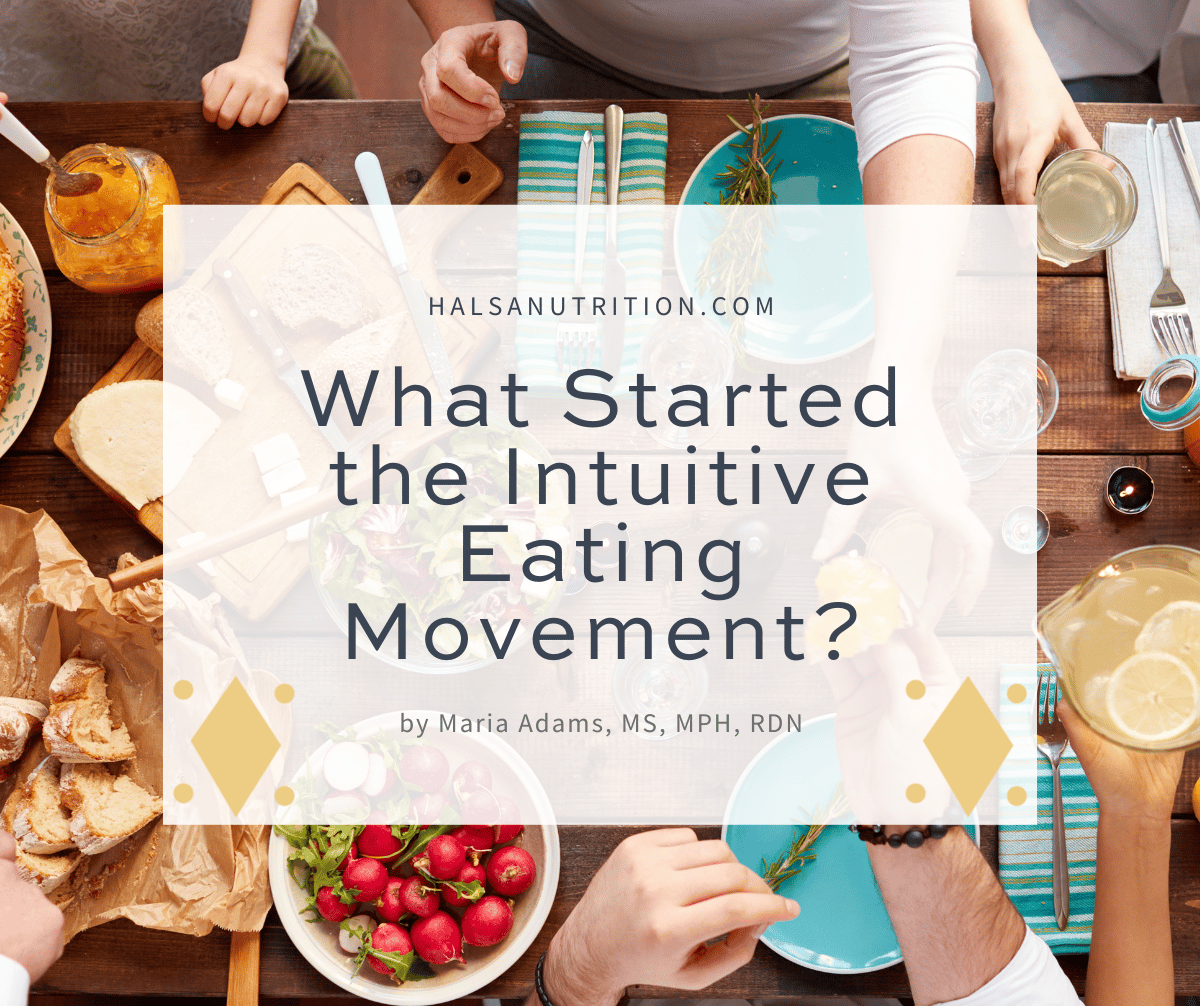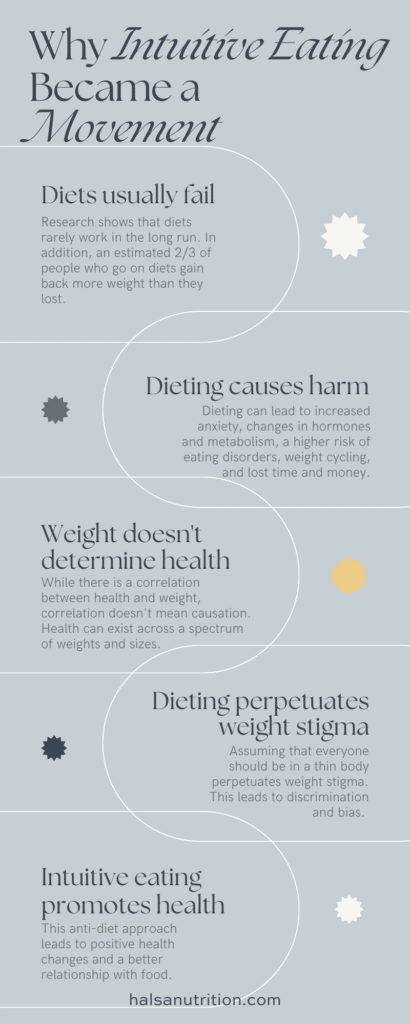
What Started the Intuitive Eating Movement?
Estimated reading time: 6 minutes
The concept of intuitive eating has become more well-known over recent years. But what started the intuitive eating movement in the first place? And why is it growing in popularity?
The History of Intuitive Eating
The premise of intuitive eating was first described in 1995 when Evelyn Tribole, MS, RDN and Elyse Resch, MS, RDN published their book, “Intuitive Eating: A Revolutionary Anti-Diet Approach.”
Intuitive eating is not a diet or a plan. Rather, it’s a framework that helps us tune into our inner wisdom when it comes to eating and movement. Interestingly, if it weren’t for diets, intuitive eating wouldn’t even be a thing. It would just be regular eating!
A big part of intuitive eating is body respect and self-compassion, which means treating ourselves with kindness and understanding. For this reason, it’s not an “eat whatever you want and let yourself go” approach. Rather, it’s a “let’s get curious and figure out why you make certain choices, but without judgment” approach.

Why Did Intuitive Eating Become a Movement?
Though the idea of intuitive eating has been around for almost 40 years, it wasn’t until more recently that this anti-diet, weight-inclusive approach became more common among dietitians and other healthcare practitioners. According to a recent New York Times article, there are currently over 2,000 Certified Intuitive Eating Counselors. In addition, there have been over 200 studies documenting the benefits of intuitive eating.
Diets Usually Fail
The intuitive eating movement has grown among dietitians largely because of the failure of diets. Dietitians are traditionally trained to help people lose weight through behavior changes such as with food choices and exercise habits. However, over the years, dietitians have come to realize both through their own personal experience with clients and also the research studies out there, that diets rarely work in the long run.
One 2020 study looking at popular diets found that while weight loss was attained at 6 months by 12 months weight loss had diminished. Another study found that the probability of people in larger body sizes attaining a lower body weight or maintaining lost weight is low.
More research is needed to determine why weight loss is so hard to maintain. But we do know that dieting affects everything from your hunger hormones to your metabolism. A commonly accepted theory is that humans have evolved to survive famines. This means that our bodies fight to protect us from weight loss and also work to gain back lost weight.
In addition, dieting often leads to the “what the hell effect”. This happens when a dieter indulges in a food or amount of food that they were trying to restrict. The brain views this as, “well, you already blew your diet so you might as well keep eating.” Maybe the dieter decides to try again the next day or the next week and so the cycle continues.
Dieting Causes Harm
Studies show that dieting causes harm. Weight cycling, also known as losing weight and then gaining it back, has been found to be more harmful than staying at a higher weight. And overall about 2/3 of people who lose weight gain back more weight than they lost.
In addition, dieting consists of disordered eating behaviors, and going on any type of diet increases the risk of developing a full-fledged eating disorder.
Boston area dietitian Audrey Young, MS, RDN, LDN, CDCES, became drawn to the intuitive eating approach after realizing that many of her patients were having increased anxiety around food choices (everything from what, where, to when to eat). She attributes this anxiety to the increased prevalence of diet culture, including the rise in food and body advice from influencers on social media.
Finally, another harm of dieting is the lost time and money spent on diet books, plans, and pills. In her book “Anti-Diet”, Christy Harrison, MPH, RD, calls dieting the life thief because it steals not only your time and money but also your well-being and happiness.

Weight Doesn’t Determine Health
Moreover, research has shown that weight isn’t the definite answer to health that we once thought it was. Studies show that while there is a correlation between health and weight, correlation doesn’t mean causation. Data shows that health can exist across a spectrum of weights and sizes.
More recently, there has been criticism of the BMI (Body Mass Index) as a measurement of health. As it turns out, this scale was created by a Belgian in the 1800s as a statistical exercise to determine the “average man.” It was never intended to be used to determine the health of an individual, and certainly not the health of all populations since the data was based only on only white, European men.
And while BMI is still commonly used in the healthcare field, research shows that people in the “overweight” category actually have the lowest risk of chronic disease and death compared to other BMI groups.
Weight Stigma
Assuming that everyone should be in a thin or “straight-sized” body also perpetuates weight stigma. This is a problem for many reasons as it leads to discrimination and bias. Interestingly, weight stigma is associated with a higher risk of health harm than weight gain.
Health at Every Size® (HAES®) is a movement that is working to end weight discrimination and fight for equal healthcare for all bodies. The principles of HAES® are a “continuously evolving alternative to the weight-centered approach to treating clients and patients of all sizes”.
Bottom Line
Many dietitians have become advocates of the intuitive eating movement because the evidence shows that diets don’t work in the long run and generally cause harm. At this time we don’t yet have a safe and effective way to promote weight loss.
Intuitive eating, on the other hand, puts weight aside and instead focuses on reconnecting with behaviors that make you thrive and treating yourself with kindness. This leads to an improved relationship with food and exercise in addition to an overall greater sense of well-being.
Finally, it has become more clear that health is not defined by weight. It’s possible to have healthy behaviors at any size. Intuitive eating aligns well with the principles of HAES® and practicing from a weight-inclusive lens.
Resources
If you are interested in learning more about intuitive eating, the book “Intuitive Eating” by Evelyn Tribole, MS, RDN and Elyse Resch, MS, RDN is the go-to primary source.
The following blog posts may also be of interest:
- Discover the Joy of Intuitive Eating
- The Honeymoon Phase in Intuitive Eating
- Intuitive Eating for Teens
- Health Benefits of Intuitive Eating
- 10 Non-Diet Books That Inspire
- Letting Go of the Diet Mentality
- Diet Culture and How to Spot It
- What are the Factors of Good Health?
- How to Have Respect for Your Body and Improve Your Body Image
- An Intuitive Eating Plate and Other Plate Models
For individual support with intuitive eating, consider working with a Registered Dietitian who takes an intuitive eating approach. Hälsa Nutrition is currently taking on new clients. Learn more here.

Leave a Reply